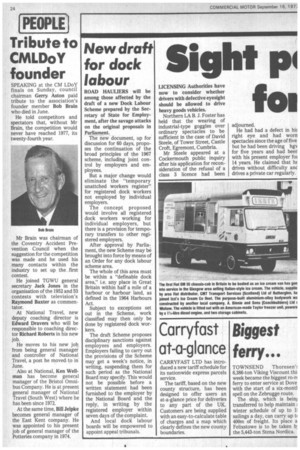New draft for dock labour
Page 26

If you've noticed an error in this article please click here to report it so we can fix it.
ROAD HAULIERS will be among those affected by the draft of a new Dock Labour Scheme prepared by the Secretary of State for Employment, after the savage attacks on the original proposals in Parliament.
The new document, up for discussion for 60 days, proposes the continuation of the broad principles of the 1967 scheme, including joint control by employers and employees.
But a major change would eliminate the "temporary unattched workers register" for registered dock workers not employed by individual employers.
The concept proposed would involve all registered dock workers working for individual employers, but there is a provision for temporary transfers to other registered employers.
After approval by Parliament, the new Scheme may be brought into force by means of an Order for any dock labour scheme area.
The whole of this area must be within a "definable dock area," i.e. any place in Great Britain within half a mile of a harbour or harbour land, as defined in the 1964 Harbours Act.
Subject to exceptions set out in the Scheme, work classified may then only be done by registered dock workers.
The draft Scheme proposes disciplinary sanctions against employees and employers. Employers failing to carry out the provisions of the Scheme may get a week's notice, in writing, suspending them for such period as the National Board may specify. This would not be possible before a written statement had been furnished to the employer by the National Board and the reply, in writing by the registered employer within seven days of the complaint. And local dock labour boards will be empowered to appoint appeal tribunals.
































































































































